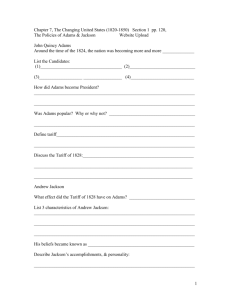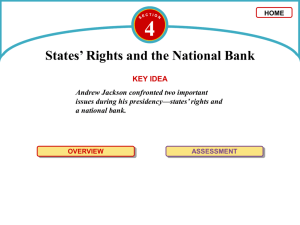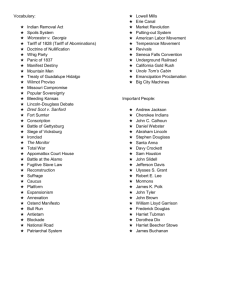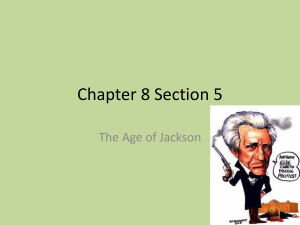Document
advertisement
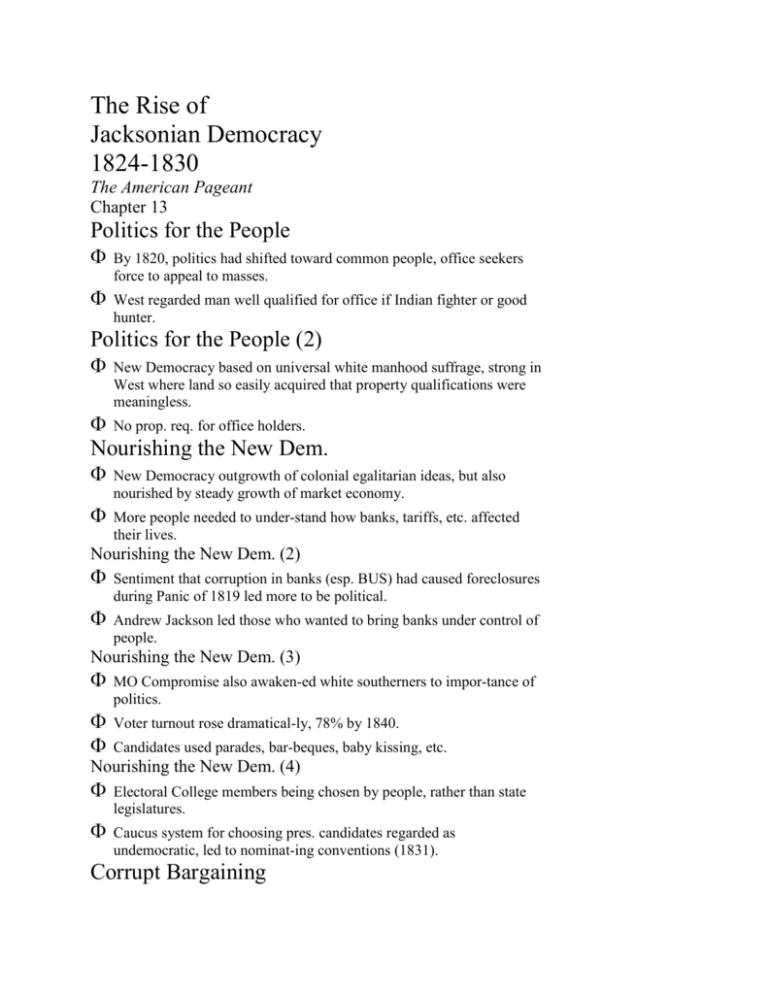
The Rise of Jacksonian Democracy 1824-1830 The American Pageant Chapter 13 Politics for the People By 1820, politics had shifted toward common people, office seekers force to appeal to masses. West regarded man well qualified for office if Indian fighter or good hunter. Politics for the People (2) New Democracy based on universal white manhood suffrage, strong in West where land so easily acquired that property qualifications were meaningless. No prop. req. for office holders. Nourishing the New Dem. New Democracy outgrowth of colonial egalitarian ideas, but also nourished by steady growth of market economy. More people needed to under-stand how banks, tariffs, etc. affected their lives. Nourishing the New Dem. (2) Sentiment that corruption in banks (esp. BUS) had caused foreclosures during Panic of 1819 led more to be political. Andrew Jackson led those who wanted to bring banks under control of people. Nourishing the New Dem. (3) MO Compromise also awaken-ed white southerners to impor-tance of politics. Voter turnout rose dramatical-ly, 78% by 1840. Candidates used parades, bar-beques, baby kissing, etc. Nourishing the New Dem. (4) Electoral College members being chosen by people, rather than state legislatures. Caucus system for choosing pres. candidates regarded as undemocratic, led to nominat-ing conventions (1831). Corrupt Bargaining 4 “Republican” candidates in 1824 election: Jackson, Clay, Q. Adams, W. Crawford. Jackson had strongest appeal, campaigned on salvation from corruption & privilege. Corrupt Bargaining (2) Jackson won most votes, but not majority of Electoral College. But Clay was Speaker of House, could influence decision. 12th Amend. directs House to decide among top 3 candidates; Clay eliminated. Corrupt Bargaining (3) Clay hates Jackson, throws support to Adams, House elects Adams on 1st ballot (1825). A few days later, Clay announced as Sec. of State. Jacksonians cried “corrupt bargain,” against will of people. Yankee in White House Having received <1/3 of pop. vote, Adams needed political skills, but was tactless thinker. Refused to make room for supporters in gov’t posts, did not establish loyal following. Yankee in White House (2) Tide moving away from nationalism to sectionalism, but Adams pursued nationalist agenda. Proposed national university, roads & canals, even observatory. Yankee in White House (3) Public reaction unfavorable: waste of money, req’d tariff, meddling in local affairs could endanger slavery. Adams also upset westerners in dealing fairly with Cherokee, curbing land speculation. “Tariff of Abominations” Jacksonites in Congress tried to hurt Adams by proposing tariff increase – as high as 45% on manufactured goods, & heavy tariff on raw materials (wool). New England would not want wool tariff, vote against. “Tariff of Abominations” (2) But New England liked manufactured goods tariff so much, Tariff of 1828 passed, plan backfired. Southerners outraged, called it “Tariff of Abominations,” or “Black Tariff.” “Tariff of Abominations” (3) South Carolina esp. protested, concerned that if Wash. could force will on states over tariff, why not slavery? Also, Old South hurting economically, tariff provided convenient scapegoat. Tariff Yoke in South South thought tariff hurt them: they sold their cotton on open world market, but bought manufactured goods in heavily protected American market. Protection allowed northern manufacturers to charge more. Tariff Yoke in South (2) Also, higher prices meant less volume, English producers buy less southern cotton: South hurt 2 ways. 1828: “The South Carolina Exposition” published – secretly written by VP Calhoun. Tariff Yoke in South (3) Exposition called tariff unconstitutional, proposed nullification. No other states followed SC. Calhoun, a southern nationalist, thought nullification would allow preservation of union. “Whole Hog” for Jackson Jackson’s campaign for 1828 election started day of corrupt bargain. Republicans split: National Republicans (Adams) & DemocraticRepublicans (Jackson). “Whole Hog” for Jackson (2) Jacksonians: “Shall the people rule?” - voters had been thwarted in 1825. Mudslinging: Adams support-ers brought up Jackson’s accidental bigamy with Rachel Robards, his several duels, etc. “Whole Hog” for Jackson (3) Rachel Jackson crushed by accusations, died before Jackson sworn in as pres. Jackson convinced they killed his wife – bitter. Jackson supporters brought up Adams’ billards table. Jacksonian Revolution 1828: Jackson defeats Adams. Adams returned to serve in House for 17 years. “Revolution” in the sense that power center was moving west, toward common man – “The people shall rule!” Advent of “Old Hickory” Jackson emaciated from bouts with dysentery, malaria, tuberculosis, & lead poisoning from 2 lodged dueler’s bullets. Called “Old Hickory” for toughness, had violent temper. Advent of “Old Hickory” (2) 1st President from West, 1st to be nominated at a formal party convention (1832), and only 2nd (Washington) not to have college education. Suspicious of fed gov’t as bastion of privilege. Advent of “Old Hickory” (3) Sought to return gov’t to simpli-city of Constitution, hostile to active economic role, e.g. Clay’s American System. Ignored Sup. Ct. upon occasion, dominated Congress (used veto unprecedented 12 times). Jackson/Spoils System Jackson instituted spoils system on a large scale, with it politics for many was a full-time pursuit. Copied NY & PA, where politi-cal machines based on spoils were already operating. Jackson/Spoils System (2) Some housecleaning was needed as previous 28-year 1-party rule had created corruption, incompetence in civil service. New Democracy did like idea of “rotation in office,” so as to not create a bureaucratic class. More Victors Than Spoils Jackson believed way to reform is sweeping out Adams-Clay people, but actually only replaced 20% in 8 years. Office seekers hounded Jackson, invaded privacy More Victors Than Spoils (2) Merit was replaced with loyalty to Jackson as basis for political appointments. Some men bought appointment with political contributions and many scandals ensued (e.g. Swartwout). More Victors Than Spoils (3) Spoils system built up potent political machine, greased by gifts from party members hoping to get positions & percentage levies on salaries. Cabinet Crises Jackson’s cabinet mediocre, except Sec. of State Martin Van Buren. Informal advisors added to 6 formal positions, called “Kitchen Cabinet.” Actually never officially met. Cabinet Crises (2) 1831: Scandal wrecked cabinet when Sec. of War Eaton married disreputable Peggy O’Neale. Peggy Eaton snubbed by ladies of Jackson’s gov’t, esp. Mrs. Calhoun (VP). Cabinet Crises (3) Jackson, remembering own personal scandal, defended Mrs. Eaton’s chastity, tried to force her social acceptance. Jackson/Calhoun split, Calhoun resigned vice presidency in 1832. Cabinet Crises (4) 1832: Calhoun elected to Senate as champion of S. Carolina. Eaton affair caused Civil War? Falling out with Jackson paralleled Calhoun’s change from nationalist to southern sectionalist (“Great Nullifier”). Webster-Hayne Duel 1829-30: Debate in Senate showing sectional jealousies. Western senators defended interests, found ally in South. New England resented power shift to West, in Senate tried to curb sale of public lands. Webster-Hayne Duel (2) Robert Hayne from SC rep. West/South. Recalled disloyalty of NE during 1812 War, condemned 1828 Tariff. Argued that nullification was only way to protect southern interests. Webster-Hayne Duel (3) “Godlike” Daniel Webster rep. New England in 9-day debate with Hayne in Jan., 1830. Argued that people, not states, had formed union. Against nullification: either Sup. Ct. judges or union ends. Websterian Cement 40,000 copies of Webster’s reply printed, arguments for union affected Northerners, incl. young Abraham Lincoln. Webster did more than anyone to prepare coming generation to fight for cause of union. Websterian Cement (2) 1830: States’ rights leaders attempted to get Jackson to lean toward states’ rights at party. Jackson heard of plan, foiled it. Hardened his position as unionist, against hated Calhoun.

